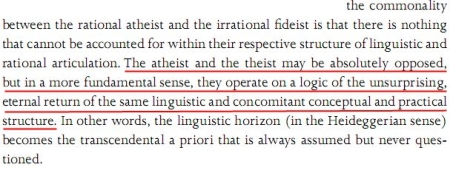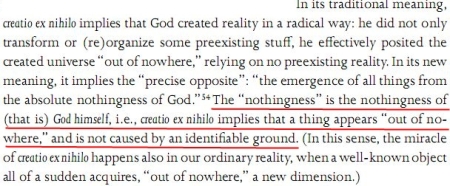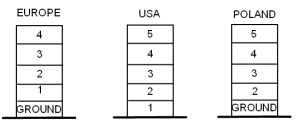Atheism has never been funnier than from the mouth of Zizek. Anyone can blaspheme about God and rely on absurdest mockery, but only Zizek can take the priest by the cross and tell them with all sincerity that “only atheists can truly believe”. For in the mind of Zizek, it is atheism that exemplifies the properly dialectical logic of the Event of Christ as to truly understand Christ one has to take the death of God through to its traumatic conclusion. This is a series of notes and summaries of some of the important arguments from the book.
The introductory piece by the editor Creston Davis sets the scene between the two theoretical juggernauts that are Slovoj Zizek and John Milbank. It is written in a theory laden and condensed manner that spell out the political implications and emancipatory stakes in both positions (as I exemplified in this quick quote post HERE). The point of the book is to overcome the myopia of contemporary public debates played out in the best sellers lists between figures such as Dawkins and McGrath by exposing the limitation of their rational dismissal of the other. Dawkins relies on belittling metaphors about spaghetti monsters to expose the absurd logic of theism while leaving the presumptions about his own use of reason and logic intact.

What Zizek and Milbank agree on is that the terms of debate need to be reassessed not rehashed and sold as lower-middle class coffee table reading or quotable toilet book material (such must be the destination for Hitchen’s rhetorical The Quotable Atheist). The point of tension for Zizek and Milbank is Hegel: the true thinker of the dialectic and therefore the thinker of the contradiction of atheism and fideism. This takes my mind back to my reading of After Finitude. Here’s a section from my notes that nicely summarizes the state of the situation:
Even after successfully critiquing meta-physico religiosity, this does not disprove God but only a type of God which appeals to natural reason to declare the superiority of its own beliefs. To remove proof of the ‘supreme’ supported by reason reverses the process of the destruction of polytheistic religion suffered at the hands of monotheistic religious reason (p.45). What does this produce? Fundamentalist fideism: a defence of religiosity in general which promotes the superiority of piety over thought, thus removing reason from any ground to a belief in God or gods. The result is a religionizing of reason: beliefs are legitimate as nothing but beliefs, not as reasonable beliefs (p.47). Philosophical works such as by Levinas pursue a sceptico-fideist closure of metaphysics dominated by the ‘wholly-other’ (p.48). Fideism is merely another name for strong correlationism. The correlationist cogito can thus be non-representational and institutes a species solipsism (rather than individual solipsism – Heidegger’s being-in-the-world could be a species solipsist claim).
For me, this was the best stuff from After Finitude, as it explained the resurgence of theology in the modern world impeccably. Obviously, Zizek is looking to reassert the Enlightenment logic of Hegel’s dialectic to overcome the end of the principle of sufficient reason where God is the guarantor of necessary and meaning existence. Milbank, however, is looking to reassert the primacy of theology through a positive ontology that answers Meillassoux’s concerns over the status of reason itself. Both Zizek and Milbank are determined to use Hegel as the linchpin of their respective positions, but having only read Zizek’s part so far I cannot comment on just how Milbank appropriates the Hegelian dialectic.
For a good overview of how Zizek understands the subject to come from being torn asunder between a barred nature and culture, see my post on Adrian Johnston explaining the ambiguities of Zizek’s reading of the Lacanian ‘death drive’ HERE.
Zizek nicely summarizes his position again and again, here is an example:
It is easy to follow from this just how Zizek’s Communist politics dovetails nicely into this deduction: Communism is true birth of the holy ghost as love and solidarity between subjects that have overcome their reliance on transcendence and embraced the true meaning of Jesus’ message when he says “Lay not up for thyself treasures, whereby thou stealest from thy neighbour and markest him to starve: for when hast thy goods safeguarded by the law of man, thou provokest thy neighbour to sin against the law” (p.70). Zizek interprets this to mean ‘property is theft’, to which Marx’s call for the abolition of private property is an echo of Jesus’ sermon!
Zizek goes on to use Meister Eckhart’s notion of the Godhead, the void-One beyond Word that Zizek will characterize as ‘un-God’. The un-God does not have positively existence (1) as it is nothing (0). Creation thus comes from nothing:
This lead into the final stretches of his chapter which frame his Hegelian dialectics within the atheistic confines of Badiou’s mathematical ontology: the background of multiple multiplicities of the void (as zero) which can never have a final substrata (‘the One is not’). This is materialist without the assertion of a foundational material density, but a materialism taken to its limit assumes only void. To demonstrate how the ground (0) is also the place of figuration (1) I’ll illustrate Zizek’s example using international floor numbering principles for buildings:
Poland has the correct solution, Zizek assures us, as the ground floor is that which is “always-already given, and as such, cannot be counted”, but “the moment one starts to count the floors the ground floor itself must be counted as one”. The ground as nothing comes before any count, and anything that is counted has, ultimately, nothing as its ground. Zizek’s negative ontology converges with Badiou’s on this point, but separtes over the understanding of human animality.
Badiou’s seemingly realist stance towards man is that he is an animal that is governed by pleasure principle and mediated by the reality principle. The human animal becomes an (infinite) subject only through fidelity to Truth-proceedurs known as Events (which are unschematized openings, unlike Heideggerian Ereignis). Zizek chastises Badiou for not recognizing the way the subject retroactively constitutes his nature and thus has no natural nature, as Badiou insists, to be elevated from. For Zizek, the subject is already distorted by ‘death drive’ and thus it is only materialism that can explain consciousness, rather than as Badiou’s work suggests, the natural state of man can be understood through evolutionary-positivist type of materialism yet subjectivity proper can only be understood through his brand of materialism.
Zizek ends his piece with as statement of ‘infinite’ negation: “I believe in un-God”, as the pure form of belief deprived of its substantialization. It is clear from this why Zizek is known as a materialist theologian, as by following Badiou’s mathematical ontology, and theory of the subject, the quest for universality comes into view through the dialectizing of the logic of atheism and theism. Both Zizek and Badiou see the figure of St Paul as a model here (he universalized the teaching of Christ without placing them into prescriptive dogma): as it is through the Universality attempted by Christianity that becomes the model by which capital, which cannot fulfil the position of ‘a signifier that matters’ (Master-signifier), can be deposed.
There is a lot more from this chapter I would like to write about, but I will go into some more detail, primarily concerning Zizek’s reading of Eckhart, only after I have read through Milbank’s contribution.











